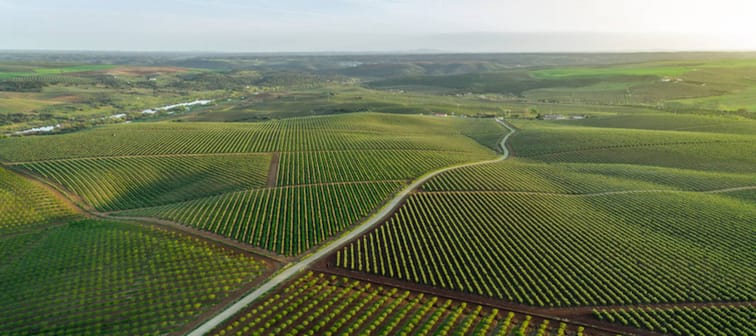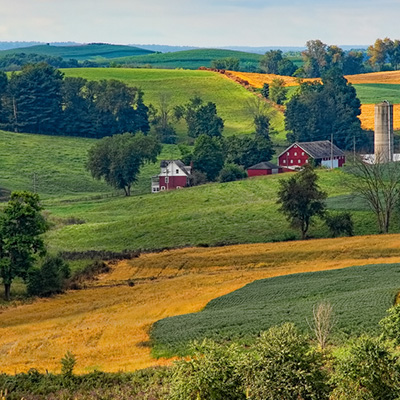Why are billionaires buying up farmland?

Farmland may not provide the short-term pop that growth stocks sometimes do, but its long-term potential has inspired many famous investors to buy in and help give their portfolios a better chance of holding steady when other assets plummet.
One is Michael Burry, the forward-thinking investor who famously shorted the U.S. housing market prior to its crash in 2007 and was then portrayed by Christian Bale in the film The Big Short.
Burry has invested heavily in farmland since then, insisting that such real assets could outperform less tangible alternatives, like tech stocks, because they are essential, scarce and generate cash flow.
"Agricultural land with water on site will be very valuable in the future, and I have put a good amount of money into that,” Burry said in a 2010 interview with Bloomberg.
Warren Buffett, one of the world’s most trusted investing veterans, has owned farmland since 1986.
"I needed no unusual knowledge or intelligence to conclude that the investment had no downside and potentially had substantial upside,” Buffett wrote in his 2014 annual letter to Berkshire Hathaway’s shareholders, describing a 400-acre farm he bought north of Omaha.
“There would, of course, be the occasional bad crop, and prices would sometimes disappoint. But so what? There would be some unusually good years as well, and I would never be under any pressure to sell the property. Now, 28 years later, the farm has tripled its earnings and is worth five times or more what I paid. I still know nothing about farming and recently made just my second visit to the farm."
Years later, he hasn't changed his tune, telling shareholders in 2022 that “if you said, for a 1% interest in all the farmland in the United States, pay our group $25 billion, I’ll write you a check this afternoon."
Burry and Buffett aren’t the only billionaires putting their money behind farmland. Guess who owns more farmland than anyone else in America: Microsoft co-founder Bill Gates.
In the summer of 2022, Gates secured legal approval to purchase another 2,100 acres of farmland in northeastern North Dakota — adding to his nearly 270,000-acre empire across dozens of states.
Stabilize your portfolio by investing in farmland
Farmland is one of the top asset classes capable of insulating your money from volatile market conditions. Learn how you can use FarmTogether to safeguard your portfolio.
Diversify nowWhat can farmland do for a portfolio?

Thankfully, you don’t need to be a CEO or hedge fund heavyweight to leverage the potential benefits of farmland, especially in turbulent times.
Historically, farmland investments have experienced less volatility than both traditional or alternative asset classes, have enjoyed low correlation to public markets and have offered strong, stable returns, according to research from FarmTogether using data from the S&P 500, Bloomberg Barclays U.S. Aggregate Index and NCREIF Property Indices.
The NCREIF Farmland Property Index, which tracks the value of U.S. row and permanent cropland, has more than tripled since 2000.
Just in the last year, the value of American farm real estate — that's both land and buildings — has jumped 12.4%, based on USDA estimates. Cropland in particular leapt 14.3% from August 2021 to August 2022.
Opportunities abound. Take a look at the projected profits from one of FarmTogether’s recent pistachio deals, Oak Ridge Pistachio Orchard. Its target net internal rate of return — the expected annual yield after accounting for fees and other costs — is 9.8%.
But more important than growth potential for weary investors is that farmland has historically been one of the most recession- and inflation-resistant investments available, meaning it can be an especially appealing safe-haven option in a volatile post-COVID world.
With a mere -0.06 correlation to the U.S. stock market over the last 30 years, farmland returns tend to weather a market-wide downturn without any dramatic tumbles. (Compare that to U.S. REITs, which have a 0.45 correlation to stocks.) Total farmland returns have consistently more than doubled the inflation rate since before 1992.
The many potential benefits of farmland investing have both individual and institutional investors taking notice.
Case in point: In 2005, there were fewer than 20 farmland-focused funds worldwide. By early 2020, there were 166 funds, with total assets under management of $38 billion.
“Now more than ever, investors are looking to diversify their portfolios into assets that can protect against uncertainty and inflation. Farmland does just that," says FarmTogether Head of Asset Management Boyd Corkins.
"As an asset class, agriculture is positioned to traverse the macro level shocks, volatility and increased uncertainty we’re seeing in other asset classes.”
How easy is it to invest in farmland?

Investors can use farmland to help diversify their assets, stabilize their portfolios and hedge against inflation.
However, because farmland has historically lacked an accessible and trusted public market, like real estate’s multiple listing service, it hasn't had a reputation for being the most approachable of assets. Opportunities to buy, and the information required to make smart purchases, have traditionally been in short supply.
It’s no surprise, then, that billionaires and some of the country’s biggest asset managers have had an inside track on farmland for the past several decades.
Thankfully, platforms like FarmTogether are changing the game.
FarmTogether is helping accredited investors access institutional-quality farmland, giving them a chance to buy into a long-overlooked asset that can help stabilize today's often rocky portfolios.
With a minimum investment of only $15,000, investing through FarmTogether requires a fraction of the capital required to purchase and manage an actual farming enterprise.
And if you want to find out more, FarmTogether has a robust learning center that provides comprehensive information, both about farmland investing and the individual farms FarmTogether members can purchase shares in.
“U.S. agriculture has, and will, continue to play a pivotal role not only within our food systems but within our portfolios,” says Corkins.
Sponsored
Diversify your investments with farmland
You don’t have to own a farm to profit off farmland.
Farmland has proven to be one of the most stable assets of the past few decades — and with FarmTogether, you’re able to invest today. FarmTogether's platform gives accredited investors access to this exciting market, and one of the highest-yielding asset classes on a risk-return basis.
Sign up for FarmTogether to start investing in farmland.






